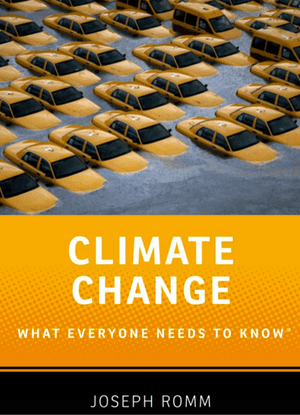‘Climate Change, What Everyone Needs to Know’ is the climate primer you’ve been waiting for

A new book makes the case that those who understand the basics of climate change and clean energy will be the “smart money” in the coming years. Those who don’t, however, will make bad decisions for themselves and their family. They might, for instance, end up holding coastal property after prices have begun to crash due to due the growing twin threats of sea level rise and storm surge.
In short, climate change isn’t just something every educated person ought to know about because it will impact future generations or because everyone will be talking about it during the upcoming Paris climate talks. It is something everyone needs to know about now because “Climate change will have a bigger impact on your family and friends and all of humanity than the Internet has had.”
“Climate Change, What Everyone Needs to Know” is part of the highly regarded Oxford University Press series of primers on subjects ranging from China to Islam, which all share the same subtitle. For its climate change book, Oxford chose Dr. Joseph Romm, the founder of the popular blog ClimateProgress.org. Romm, a physicist and former U.S. Energy Department official, writes as easily on climate science as he does on solutions.

The book is written entirely in a Q&A format, which makes it a highly readable introduction to the subject. Romm answers such basic questions as, ‘Why are climate scientists so confident that humans are the primary cause of recent warning?’ ‘Which extreme weather events are being made worse by climate change and which are not?’ ‘Why did scientists and governments decide 2°C (3.6°F) was the limit beyond which climate change becomes “dangerous” to humanity?’.
Even people who consider themselves science literate will learn from this book. Consider the question: “What fraction of recent global warming is due to human causes versus natural causes?” As Romm explains, “The best estimate from the world’s top scientists is that humans are responsible for all of the warming we have experienced since 1950.”
On the solutions side, Romm offers clear and up-to-date explanations of the roles solar, wind, biomass, and nuclear power will play in the next quarter century. If you are wondering which alternative fuel will replace oil in our cars, Romm makes a compelling case why it won’t be hydrogen but will be electricity.
Romm examines one question that few people have even thought to ask, “Does carbon dioxide at exposure levels expected this century have any direct impacts on human health or cognition?”. The surprising answer is “yes” – a subject Romm has explored in more detail in recent weeks on his website.
In the final chapter, Romm examines “How will climate change impact you and your family in the coming decades?”. Romm explains how U.S. government policies artificially inflate coastal property values and why climate change means that this trillion-dollar-bubble is going to burst in the foreseeable future. He looks at the question of how climate change should influence any decision about where to retire. He looks at what students should study today “if they want to prepare themselves for working in a globally warmed world” and maximize their future employability.
“Climate Change, What Everyone Needs to Know” is a must-read for those who want to become climate literate and join the growing conversation about the greatest threat humanity faces today – or simply for those who want to be in on the “smart money” rather than the other kind.

